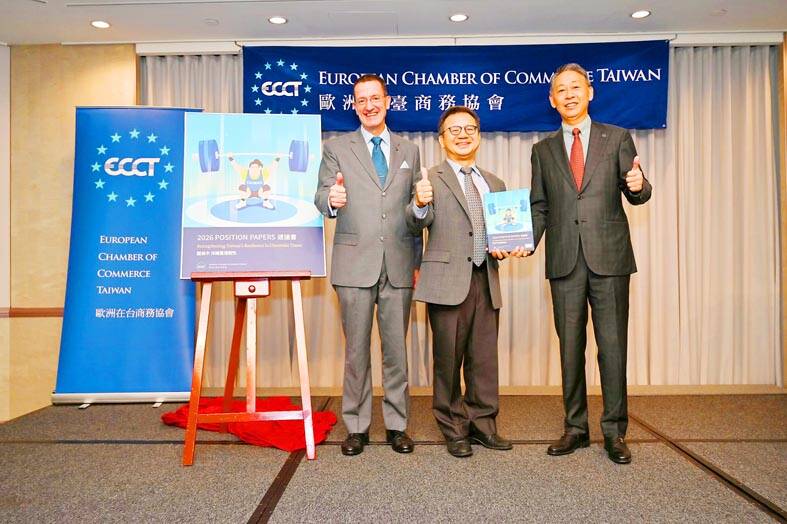The European Chamber of Commerce Taiwan (ECCT) yesterday urged the government to move faster to bolster the nation’s economic and societal resilience, cautioning that Taiwan cannot count on the artificial intelligence (AI) boom to drive growth forever.
Taiwan was one of the clear winners of the COVID-19 era tech cycle and is riding the AI demand wave, the chamber said in its annual position paper.
However, the group warned that such momentum would not last indefinitely.

Photo: CNA
“There is no telling how long the AI bonanza will continue, while Taiwan is facing numerous other economic and geopolitical challenges,” the report said, adding that the country still lacked a comprehensive, human-centered AI governance framework.
The absence of clear rules creates ethical, security and economic uncertainties for innovators, investors and the public, it said.
As the durability of the AI upswing is uncertain and geopolitical risks are increasing, Taiwan should “make hay while the sun shines” by reinforcing its energy system, workforce, infrastructure and regulatory environment, the ECCT said.
A major concern is that Taiwan is falling behind its renewable-energy targets due to global supply constraints, restrictive permitting and fragmented policymaking, it added.
The chamber urged the government to strike a better balance between maintaining reliable and affordable power, and meeting climate and energy-security objectives.
The report also identified opportunities for deeper AI collaboration between Taiwan and Europe, saying their complementary strengths could shape global standards for safe and ethical AI development.
To improve the energy transition, the ECCT recommended the government establish a dedicated energy agency, ensure adequate financing for the next phase of offshore wind projects, and ease permitting processes for geothermal and onshore wind projects.
The chamber also called for greater investment in grid and storage infrastructure, and for relaxing localization rules when there are no competitive domestic suppliers.
Additional proposals included creating a roadmap for floating offshore wind plans, expanding tax incentives for electric vehicles, and updating rules for biodiesel, sustainable aviation fuel, hydrogen and ammonia.
Demographic pressures pose another long-term vulnerability, as Taiwan turns into a super-aged society, the chamber said, calling for stronger efforts to attract and retain foreign talent, including by lower qualification thresholds, simpler visa procedures, standard three-year work permits and a new short-term business visa.
The ECCT also urged more flexible labor policies and exempting senior executives from certain requirements, saying that overly rigid rules constrain productivity and hold back women’s career advancement.
These reforms are crucial if Taiwan is to remain competitive and resilient as global conditions grow increasingly uncertain, it said.

JITTERS: Nexperia has a 20 percent market share for chips powering simpler features such as window controls, and changing supply chains could take years European carmakers are looking into ways to scratch components made with parts from China, spooked by deepening geopolitical spats playing out through chipmaker Nexperia BV and Beijing’s export controls on rare earths. To protect operations from trade ructions, several automakers are pushing major suppliers to find permanent alternatives to Chinese semiconductors, people familiar with the matter said. The industry is considering broader changes to its supply chain to adapt to shifting geopolitics, Europe’s main suppliers lobby CLEPA head Matthias Zink said. “We had some indications already — questions like: ‘How can you supply me without this dependency on China?’” Zink, who also

Taiwan Semiconductor Manufacturing Co (TSMC, 台積電) received about NT$147 billion (US$4.71 billion) in subsidies from the US, Japanese, German and Chinese governments over the past two years for its global expansion. Financial data compiled by the world’s largest contract chipmaker showed the company secured NT$4.77 billion in subsidies from the governments in the third quarter, bringing the total for the first three quarters of the year to about NT$71.9 billion. Along with the NT$75.16 billion in financial aid TSMC received last year, the chipmaker obtained NT$147 billion in subsidies in almost two years, the data showed. The subsidies received by its subsidiaries —

At least US$50 million for the freedom of an Emirati sheikh: That is the king’s ransom paid two weeks ago to militants linked to al-Qaeda who are pushing to topple the Malian government and impose Islamic law. Alongside a crippling fuel blockade, the Group for the Support of Islam and Muslims (JNIM) has made kidnapping wealthy foreigners for a ransom a pillar of its strategy of “economic jihad.” Its goal: Oust the junta, which has struggled to contain Mali’s decade-long insurgency since taking power following back-to-back coups in 2020 and 2021, by scaring away investors and paralyzing the west African country’s economy.

RE100 INITIATIVE: Exporters need sufficient supplies of renewable energy to meet their global commitments and remain competitive, the economics ministry said Local export-oriented manufacturers, including Taiwan Semiconductor Manufacturing Co (台積電), require sufficient supplies of green energy to maintain their competitiveness and regulations already ensure that renewable energy development adheres to environmental protection principles, the Ministry of Economic Affairs said yesterday, as the legislature imposed further restrictions on solar panel installations. The opposition-led Legislative Yuan yesterday passed third readings to proposed amendments to three acts — the Environmental Impact Assessment Act (環境影響評估法), the Act for the Development of Tourism (發展觀光條例) and the Geology Act (地質法) — which would largely prohibit the construction of solar panels in some areas. The amendments stipulate that ground-mounted solar